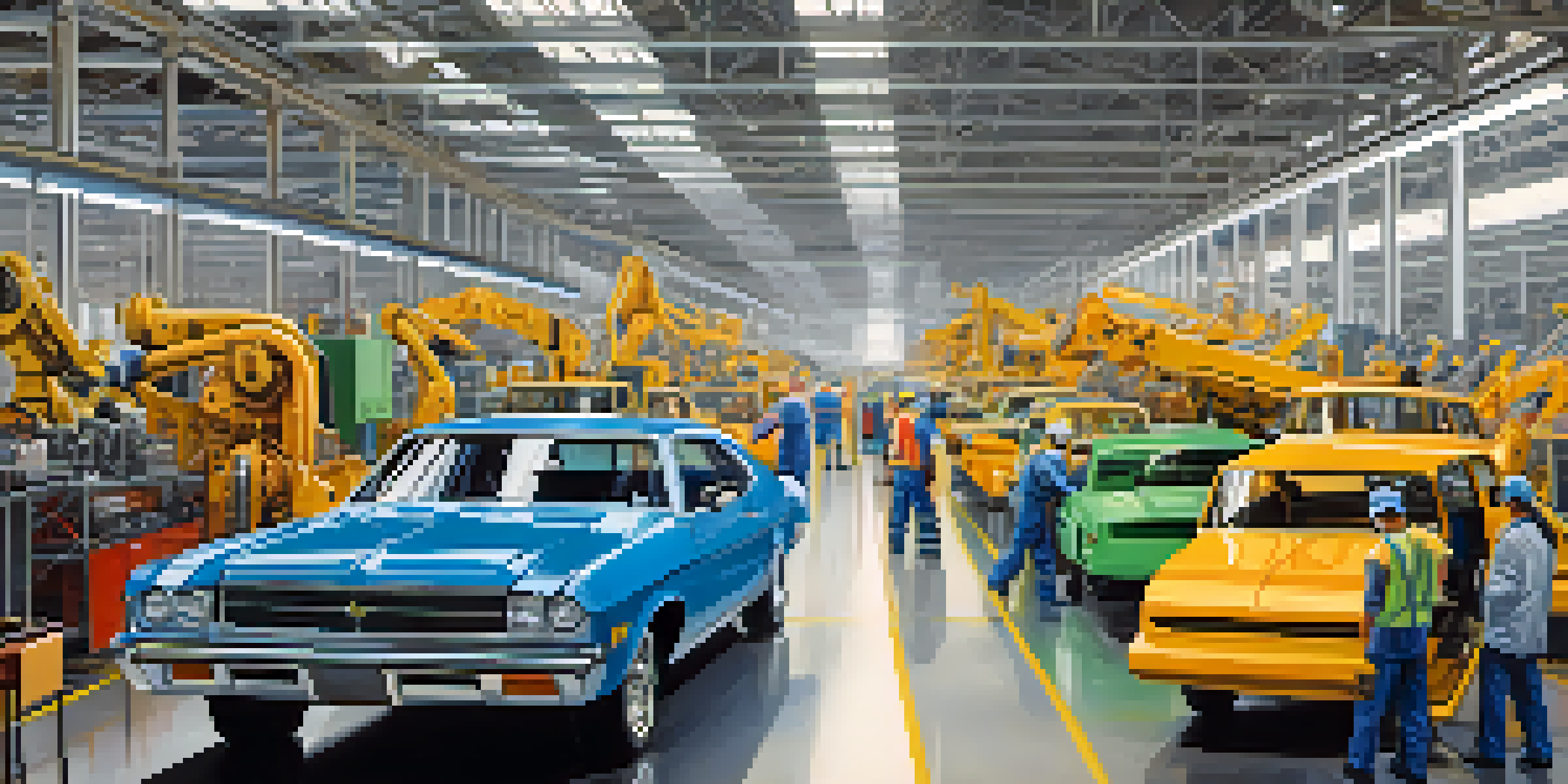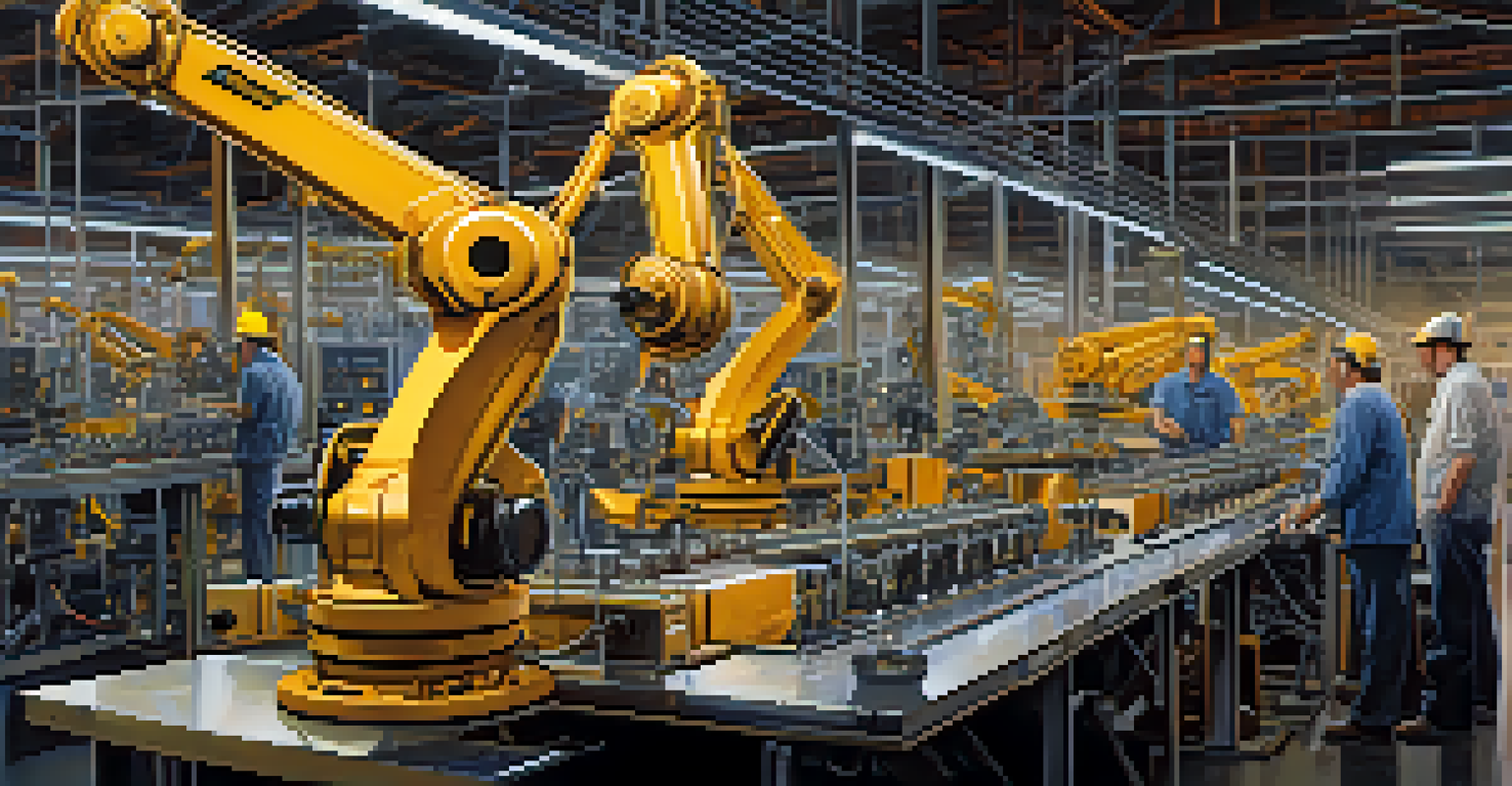The Impact of Manufacturing on Tennessee's Economy

Overview of Tennessee's Manufacturing Landscape
Tennessee boasts a rich manufacturing history that dates back over a century. Today, it is home to a diverse range of industries, from automotive to aerospace. This variety not only enhances the state's economic resilience but also attracts new companies looking to invest in a thriving environment.
Manufacturing is the backbone of Tennessee's economy, driving job creation and innovation while enhancing our communities.
In recent years, Tennessee has emerged as a leader in automotive manufacturing, with major players like General Motors and Nissan setting up production facilities. This growth has been bolstered by strategic investments in infrastructure and workforce development, making it an attractive destination for manufacturers.
The state's commitment to fostering a robust manufacturing sector is evident in its policies and incentives aimed at attracting businesses. By prioritizing industry growth, Tennessee is ensuring that manufacturing remains a cornerstone of its economy.
Job Creation Through Manufacturing Expansion
Manufacturing is a significant source of employment in Tennessee, providing jobs for hundreds of thousands of residents. The sector not only offers direct employment opportunities but also stimulates job creation in related industries, such as logistics and supply chain management.

For instance, the influx of automotive plants has led to a surge in demand for skilled workers, resulting in various training programs and partnerships between manufacturers and educational institutions. This collaboration ensures that the workforce is equipped with the necessary skills to meet industry needs.
Tennessee's Manufacturing Growth
Tennessee has become a leader in manufacturing, particularly in the automotive sector, thanks to strategic investments and workforce development.
Moreover, the jobs created are often well-paying and come with benefits, which contributes positively to local economies. As more companies set up shop in Tennessee, the ripple effect of job creation continues to bolster communities across the state.
Contribution to State GDP and Economic Growth
Manufacturing significantly contributes to Tennessee's Gross Domestic Product (GDP), showcasing its importance to the state's overall economic health. In fact, the manufacturing sector accounts for a substantial share of the state's GDP, reflecting its vital role in driving economic growth.
The future of manufacturing in Tennessee is bright, fueled by a commitment to sustainability and technological advancement.
As manufacturing companies expand and innovate, they generate increased revenue, which in turn leads to higher tax revenues for state and local governments. This additional funding can be reinvested into public services, infrastructure, and community development, creating a cycle of growth.
Furthermore, as the sector continues to evolve with advancements in technology, Tennessee's manufacturers are not only enhancing productivity but also diversifying their product offerings. This adaptability further strengthens the state's economy and positions it for future success.
The Role of Innovation in Manufacturing
Innovation plays a crucial role in keeping Tennessee's manufacturing sector competitive. Companies are increasingly adopting advanced technologies, such as automation and artificial intelligence, to streamline operations and improve efficiency. This shift not only enhances productivity but also elevates the quality of products produced.
For example, the integration of smart manufacturing technologies allows companies to monitor production processes in real time, reducing waste and increasing output. This focus on innovation not only benefits manufacturers but also creates new opportunities for skilled workers in tech-related roles.
Job Creation and Economic Impact
The manufacturing sector is a significant source of employment, stimulating job creation not only within the industry but also in related fields.
Additionally, Tennessee's investment in research and development fuels innovation, further driving the growth of the manufacturing sector. By fostering a culture of creativity and experimentation, the state is paving the way for a more dynamic and resilient economy.
Impact of Manufacturing on Local Communities
Manufacturing has a profound impact on local communities across Tennessee. As factories and plants open their doors, they breathe new life into towns and cities, providing residents with job opportunities and a sense of stability. This influx of jobs can lead to population growth and revitalized neighborhoods.
Moreover, manufacturing companies often engage with their local communities through various initiatives, such as educational partnerships and sponsorships. These efforts not only strengthen community ties but also promote a positive corporate image, fostering goodwill among residents.
As communities thrive, so do local businesses, creating a vibrant ecosystem that benefits everyone involved. The economic boost from manufacturing continues to uplift various sectors, from retail to services, showcasing the multifaceted impact of this industry.
Sustainability and Environmental Considerations
As the manufacturing sector in Tennessee grows, so does the focus on sustainability and environmental responsibility. Many companies are adopting greener practices and technologies to reduce their ecological footprint while maintaining profitability. This shift is essential for long-term sustainability.
For instance, several manufacturers are investing in energy-efficient equipment and renewable energy sources to power their operations. By doing so, they not only lower their operational costs but also contribute to a healthier environment for future generations.
Sustainability in Manufacturing
As manufacturing expands, there is a growing emphasis on sustainability, with companies adopting greener practices to reduce their environmental impact.
Additionally, regulatory frameworks and community expectations are pushing manufacturers to adopt more sustainable practices. As a result, Tennessee is becoming a model for how the manufacturing industry can thrive while prioritizing environmental stewardship.
Challenges Facing Tennessee's Manufacturing Sector
Despite its strengths, Tennessee's manufacturing sector faces several challenges that could impact its future growth. One significant hurdle is the ongoing skills gap, where the demand for skilled workers outpaces the available talent pool. Addressing this gap is crucial for sustained industry success.
Moreover, global competition presents a constant pressure on manufacturers to innovate and improve efficiency. As companies from other countries continue to enter the market, Tennessee manufacturers must remain agile and responsive to shifting market dynamics.

Lastly, economic fluctuations and trade policies can also pose risks to the sector. By staying informed and adaptable, Tennessee's manufacturing industry can navigate these challenges and continue to thrive in an ever-changing economic landscape.